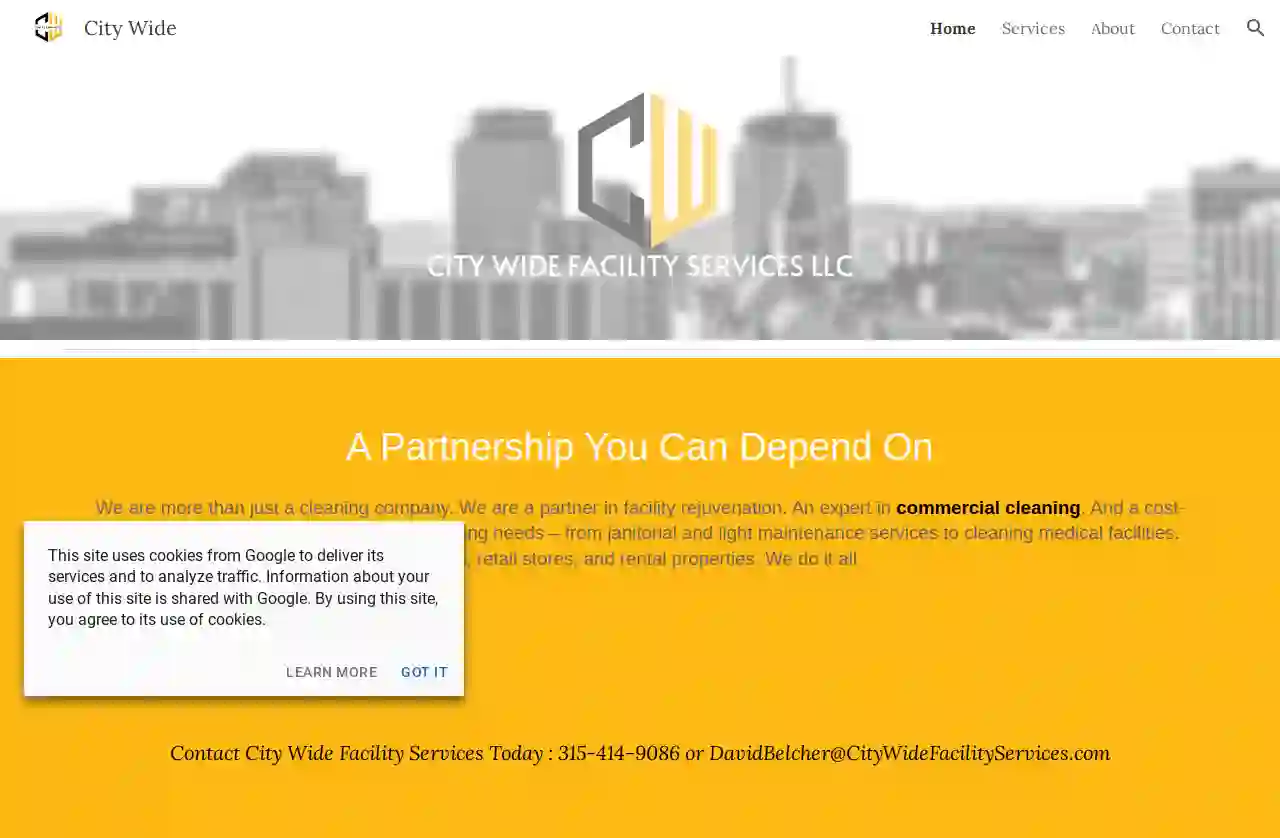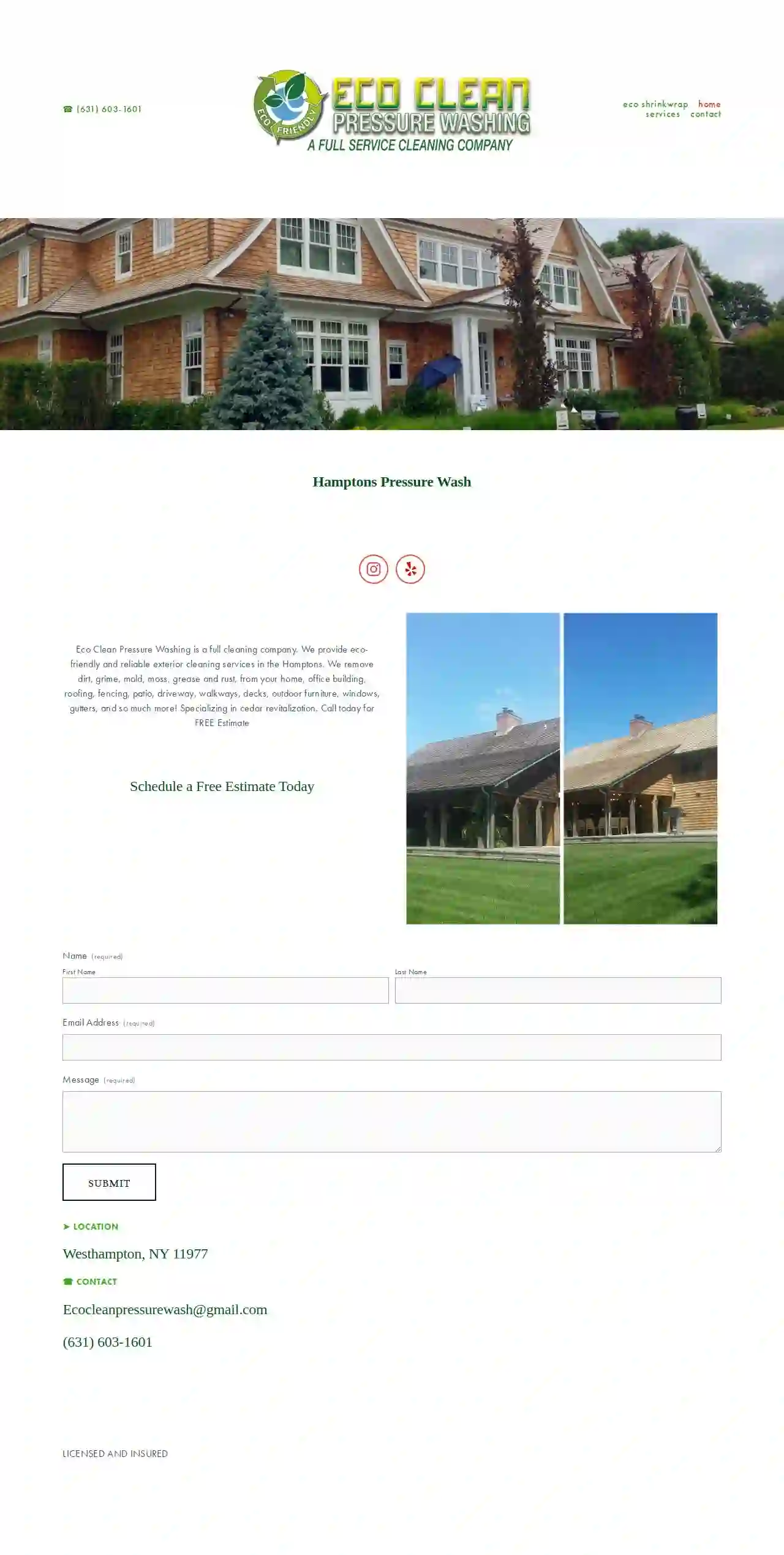Cleaning Services Schenectady
Best House Cleaning in Schenectady
Receive 3 FREE Cleaning Services quotes for your project today! Compare profiles, reviews, accreditations, portfolio, etc... and choose the best service.
Service Needed
City or Town

Angel Milani Cleaning LLC
542 reviewsSyracuse, USWe are a professional cleaning service dedicated to providing top-notch cleaning solutions for residential and commercial spaces. Our team is fully insured and pet-friendly, ensuring a safe and efficient cleaning experience. We cater to various cleaning needs, including standard cleaning, deep cleaning, commercial cleaning, and more. Our commitment to quality and customer satisfaction sets us apart from the rest.
- Services
- Why Us?
Get Quote
Commercial Cleaning Experts
52 reviewsQueens, US- Services
- Why Us?
Get Quote
Hallak Cleaners
4.143 reviewsBabylon, US- Services
- Why Us?
- Gallery
Get Quote
Paradise Business Cleaning
57 reviewsStaten Island, US- Services
- Why Us?
- Gallery
Get Quote
Pritchard Industries Inc
4.526 reviewsStaten Island, US- Services
- Why Us?
- Gallery
Get Quote
City Wide Facility Services
51 reviewsSyracuse, US- Services
- Why Us?
- Gallery
Get Quote- Mo
Morais Cleaning services
519 reviewsQueens, US- Services
- Why Us?
Get Quote 
Baly Cleaning Services, Inc.
54 reviewsBronx, US- Services
- Why Us?
Get Quote
Eco Clean Pressure Washing
538 reviewsBabylon, US- Services
- Why Us?
Get Quote
Shamara Cleaners
4.84 reviewsHempstead, US- Services
- Why Us?
Get Quote
Over 60,241+ Janitorial Services registered
Our janitorial companies operate in Schenectady and beyond!
CleaningMatch has curated and vetted the Best Janitorial Services in and around Schenectady. Find the most reliable business today.
Frequently Asked Questions About Cleaning Services
Find answers to common questions about cleaning services and hiring cleaning companies in the USA.
- Ventilation: Open windows and turn on the exhaust fan to improve air circulation.
- Declutter: Remove any items from countertops, the shower, and the floor to allow easy access.
- Pre-treat: Spray shower walls, tub, and toilet bowl with bathroom cleaner and let it sit for a few minutes to break down grime.
- Toilet: Scrub the toilet bowl with a toilet brush, paying attention to the rim and under the seat. Wipe down the exterior of the toilet with a disinfectant wipe.
- Shower/Tub: Scrub the shower walls and tub with a sponge or scrub brush. Rinse thoroughly.
- Sink: Clean the sink with a sponge or cloth and bathroom cleaner. Pay attention to the faucet and drain.
- Mirrors and Glass: Wipe down mirrors and glass surfaces with a glass cleaner and a microfiber cloth for a streak-free finish.
- Floors: Sweep or vacuum the floor, then mop with a floor cleaner designed for your bathroom floor type.
- Finishing Touches: Empty the trash can, replace towels, and put away any toiletries.
- Type of cleaning: Deep cleaning, regular cleaning, move-in/move-out cleaning, and specialized cleaning (e.g., carpet cleaning) have different price points.
- Size of the property: Larger properties typically require more time and resources, resulting in higher costs.
- Frequency of cleaning: Regular cleaning schedules often have discounted rates compared to one-time services.
- Location: Cleaning costs can differ based on regional labor costs and demand.
- Additional services: Extra tasks, such as window cleaning, laundry, or organization, will add to the overall price.
- Regular dusting: Dust frequently using microfiber cloths or a duster. Pay attention to surfaces that attract dust, such as shelves, electronics, and furniture.
- Vacuuming: Vacuum carpets and rugs regularly using a vacuum cleaner with a HEPA filter to trap dust mites and allergens.
- Air Purifier: Consider using an air purifier to remove dust particles and allergens from the air.
- Reduce Clutter: Clutter provides more surfaces for dust to settle. Declutter regularly to minimize dust traps.
- Window Treatments: Wash or vacuum window treatments, such as curtains or blinds, regularly to remove dust buildup.
- Bedding: Wash bedding, including sheets, pillowcases, and blankets, weekly in hot water to remove dust mites.
- Doormats: Place doormats at entrances to trap dirt and dust from shoes before they enter your home.
- Cleaning: Removing dirt, dust, and debris from surfaces using soap or detergent and water. It improves the appearance and removes visible contaminants.
- Sanitizing: Reducing the number of bacteria on surfaces to a safe level. It uses chemical disinfectants or heat to kill or inactivate bacteria.
- Disinfecting: Killing or inactivating most disease-causing microorganisms on surfaces. It uses stronger chemical disinfectants than sanitizing and targets a wider range of pathogens.
What is the best way to clean a bathroom?
Cleaning a bathroom effectively involves targeting key areas and using the right cleaning products. Here's a step-by-step guide:
By following these steps, you can maintain a clean and hygienic bathroom.
By following these steps, you can maintain a clean and hygienic bathroom.
How much do cleaning services cost in the USA?
Cleaning service costs in the USA vary based on several factors, including:
To get accurate pricing, request personalized quotes from reputable cleaning services on CleaningMatch. They will assess your specific needs and provide a tailored cost estimate.
To get accurate pricing, request personalized quotes from reputable cleaning services on CleaningMatch. They will assess your specific needs and provide a tailored cost estimate.
How do I prevent dust from accumulating in my home?
Dust is a common household nuisance, but several preventive measures can minimize its accumulation:
By implementing these preventive measures, you can significantly reduce dust accumulation and maintain a cleaner and healthier home.
By implementing these preventive measures, you can significantly reduce dust accumulation and maintain a cleaner and healthier home.
What is the difference between cleaning, sanitizing, and disinfecting?
While often used interchangeably, cleaning, sanitizing, and disinfecting have distinct meanings:
Cleaning is usually the first step, followed by sanitizing or disinfecting depending on the level of hygiene required.
Cleaning is usually the first step, followed by sanitizing or disinfecting depending on the level of hygiene required.
What is the best way to clean a bathroom?
Cleaning a bathroom effectively involves targeting key areas and using the right cleaning products. Here's a step-by-step guide:
By following these steps, you can maintain a clean and hygienic bathroom.
- Ventilation: Open windows and turn on the exhaust fan to improve air circulation.
- Declutter: Remove any items from countertops, the shower, and the floor to allow easy access.
- Pre-treat: Spray shower walls, tub, and toilet bowl with bathroom cleaner and let it sit for a few minutes to break down grime.
- Toilet: Scrub the toilet bowl with a toilet brush, paying attention to the rim and under the seat. Wipe down the exterior of the toilet with a disinfectant wipe.
- Shower/Tub: Scrub the shower walls and tub with a sponge or scrub brush. Rinse thoroughly.
- Sink: Clean the sink with a sponge or cloth and bathroom cleaner. Pay attention to the faucet and drain.
- Mirrors and Glass: Wipe down mirrors and glass surfaces with a glass cleaner and a microfiber cloth for a streak-free finish.
- Floors: Sweep or vacuum the floor, then mop with a floor cleaner designed for your bathroom floor type.
- Finishing Touches: Empty the trash can, replace towels, and put away any toiletries.
By following these steps, you can maintain a clean and hygienic bathroom.
How much do cleaning services cost in the USA?
Cleaning service costs in the USA vary based on several factors, including:
To get accurate pricing, request personalized quotes from reputable cleaning services on CleaningMatch. They will assess your specific needs and provide a tailored cost estimate.
- Type of cleaning: Deep cleaning, regular cleaning, move-in/move-out cleaning, and specialized cleaning (e.g., carpet cleaning) have different price points.
- Size of the property: Larger properties typically require more time and resources, resulting in higher costs.
- Frequency of cleaning: Regular cleaning schedules often have discounted rates compared to one-time services.
- Location: Cleaning costs can differ based on regional labor costs and demand.
- Additional services: Extra tasks, such as window cleaning, laundry, or organization, will add to the overall price.
To get accurate pricing, request personalized quotes from reputable cleaning services on CleaningMatch. They will assess your specific needs and provide a tailored cost estimate.
How do I prevent dust from accumulating in my home?
Dust is a common household nuisance, but several preventive measures can minimize its accumulation:
By implementing these preventive measures, you can significantly reduce dust accumulation and maintain a cleaner and healthier home.
- Regular dusting: Dust frequently using microfiber cloths or a duster. Pay attention to surfaces that attract dust, such as shelves, electronics, and furniture.
- Vacuuming: Vacuum carpets and rugs regularly using a vacuum cleaner with a HEPA filter to trap dust mites and allergens.
- Air Purifier: Consider using an air purifier to remove dust particles and allergens from the air.
- Reduce Clutter: Clutter provides more surfaces for dust to settle. Declutter regularly to minimize dust traps.
- Window Treatments: Wash or vacuum window treatments, such as curtains or blinds, regularly to remove dust buildup.
- Bedding: Wash bedding, including sheets, pillowcases, and blankets, weekly in hot water to remove dust mites.
- Doormats: Place doormats at entrances to trap dirt and dust from shoes before they enter your home.
By implementing these preventive measures, you can significantly reduce dust accumulation and maintain a cleaner and healthier home.
What is the difference between cleaning, sanitizing, and disinfecting?
While often used interchangeably, cleaning, sanitizing, and disinfecting have distinct meanings:
Cleaning is usually the first step, followed by sanitizing or disinfecting depending on the level of hygiene required.
- Cleaning: Removing dirt, dust, and debris from surfaces using soap or detergent and water. It improves the appearance and removes visible contaminants.
- Sanitizing: Reducing the number of bacteria on surfaces to a safe level. It uses chemical disinfectants or heat to kill or inactivate bacteria.
- Disinfecting: Killing or inactivating most disease-causing microorganisms on surfaces. It uses stronger chemical disinfectants than sanitizing and targets a wider range of pathogens.
Cleaning is usually the first step, followed by sanitizing or disinfecting depending on the level of hygiene required.